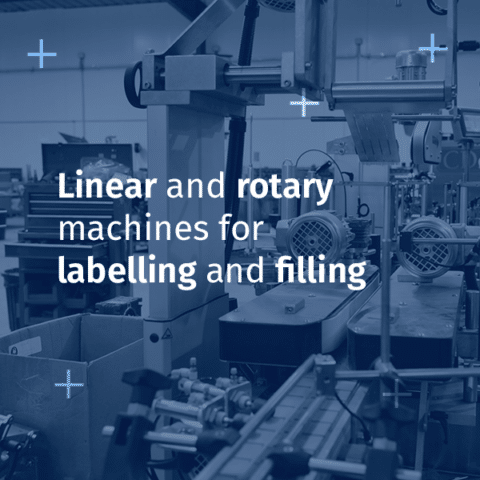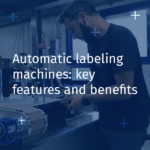In the realm of packaging, the decision between linear and rotary machines for automatic filling and labeling is pivotal for industries such as wine, pharmaceuticals, food, and more.
This comprehensive article delves into the detailed features, advantages, and drawbacks of these two types of machines.
Linear Machines: A Methodical and Precise Approach
Linear machines, arranged in a linear formation, adopt a systematic and structured approach to container processing. Fully automatic, they incorporate conveyors that facilitate precise management of the production process, offering substantial advantages in terms of precision and adaptability.
Automated conveyors, essential for the seamless movement of containers throughout the packaging process, integrate seamlessly with our machines, contributing to the optimal automation of filling, screwing, and labeling.
Linear fillers, such as the K-Net Auto and K-Line S, are renowned for their precision, integrating screwing and capping functions, providing a comprehensive solution for packaging liquid products while flexibly handling various container formats.
When it comes to automatic labeling, linear labellers like the R1000 or the Ninon Konic ensure uniform and accurate label application, meeting the stringent standards of diverse industries.
Rotary Machines: Maximizing Productivity Through a Circular Approach
Rotary machines feature a circular layout for container processing. At CDA, we favor linear solutions, as they are more versatile, simple, and efficient. However, it’s important to note that rotary fillers, screwers, and labellers are generally preferred for high-speed applications, allowing quick application through continuous movement.
Comparison of Advantages and Disadvantages
- Advantages of Linear Machines
Linear machines excel in ensuring maximum precision in filling and label application.
Their adaptability is a strong point, easily adjusting to different container formats, offering versatility to companies with varied product ranges.
Their linear approach enables methodical and structured packaging management, contributing to an optimal and efficient packaging line process.
- Disadvantages of Linear Machines
While highly accurate, linear machines can be limited in production speed compared to rotary machines, which often offer higher speeds for enhanced industrial efficiency.
Due to their in-line layout, linear machines may require more space in the production line, a consideration in factory or production workshop layout planning.
- Advantages of Rotary Machines
Rotary machines offer a significant advantage in terms of high output, providing faster packaging and maximizing overall productivity, making them suitable for high-throughput production environments.
- Disadvantages of Rotary Machines
Despite their high output, rotary machines have a major disadvantage in their low adaptability. This limitation can result in increased complexity when managing different products and formats. Additionally, rotary machines are often more complex to set up and operate than linear machines. The high initial investment associated with rotary machines can pose a financial challenge for some companies, although they may be profitable in the long term.
The Versatility of CDA Solutions
At CDA, we recognize that every business has specific needs. Our range of machines includes automatic linear solutions, providing a comprehensive response to industry requirements. Whether you require an automatic labeller for maximum accuracy or a filler to boost productivity, CDA solutions are designed to suit your production environment.
CDA’s linear machines offer a precise and organized approach to labeling and filling, ideal for companies valuing precision and versatility in product handling.
Choose the Right Solution for Your Needs
In conclusion, the choice between a linear and a rotary machine depends on the specific needs of your business. Linear machines offer maximum precision and adaptability, making them ideal for environments where format diversity is crucial. On the other hand, rotary machines maximize productivity and prove effective for high production volumes.
At CDA, we take pride in offering a complete range of filling, capping, and labeling solutions, as well as monoblocks tailored to meet every requirement across various industries.







